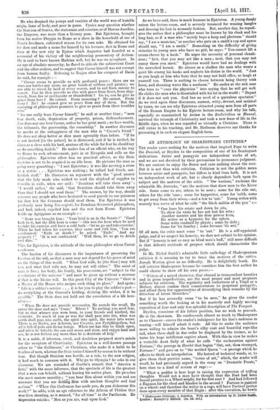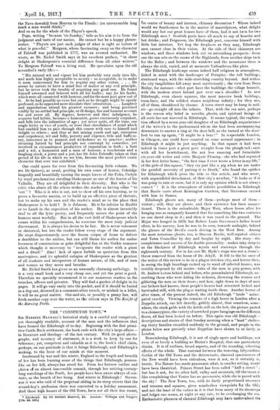AN ANTHOLOGY OF SHAKESPEARE CRITICISM.•
THE reader cares nothing for the motives that inspired Pope to write the Dunciad, or Dryden to the composition of one of his flamboyant dedications. Satire and panegyric are independent works of art, and we are not deceived by their pretensions to pronounce judgment. We are content to enjoy the flower and care nothing about the root. But it is not thus with criticism. Criticism is not the golden mean between satire and panegyric, but differs in kind from both. It is not an independent work of art, but is closely dependent both upon its subject and the motives of the critic. "'Ow warious," exclaims the admirable Mr. Jorrocks, " are the motives that draw men to the Kiver side. Some come to see, others to be seen ; some for the ride out, others for the ride 'ome ; some for happetites, some for 'ealth, some to get away from their wives,—and a few to 'unt." Young writes with scarcely less verve of what he calls " the black militia of the pen " :—
" Ono loses his estate and down he sits, To show (in vain) he has not lost his wits : Another marries and his dear proves keen, Ho writes as a hypnotic for the spleen. Some write confined by physic ; some by debt ; Some for 'tis Sunday ; some because 'tis wet."
Of all men, the critic must come " to 'unt." He is a self-appointed' judge, and if we suspect his honesty, we dare not submit to his opinion. But if " honesty is not as easy as blind man's buff," still more difficult is that delicate rectitude of purpose which should characterize the judge.
In Mr. Nichol Smith's admirable little anthology of Shakespearean criticism it is amusing to try to trace the motives of the critics. Joseph Walton gives us no difficulty. He is delightfully frank. He will criticize Shakespeare because he considers him the best author ho could choose to show off his own paces :—
" Writers of a mixed character, that abound in transcendent beauties and in gross imperfections, are the most proper and most pregnant subjects for criticism. The regularity and correctness of a Virgil or a Horace, almost confine their commentators to perpetual panegyric, and afford them few opportunities of diversifying their remarks by the detection of latent blemishes."
But if he has avowedly come "to be seen," he gives the reader something worth the looking at in his masterly and highly moving exposition of Lear and only less splendid description of The Tempest.
Dryden, conscious of his loftier position, has no wish to peacock. He is the showman. He condescends almost as much to Shakespeare as to Chaucer—craves the reader's indulgence for his lion's rudeness in roaring—will himself admit it rude. All this to make the audience more willing to admire the beast's silky coat and beautiful rope-like tail, when these shall in due order be displayed by the trainer, as he turns his huge indifferent captive about. With this in view he makes a veritable Aunt Sally of what he calls " the exclamation against
Fortune," the passage in Hamlet that begins "Out, out, thou strumpet, Fortune !" and goes on to "the mobled -Queen "—a passage which he
affects to think an interpolation. His hatred of technical words, or, to give them their prettier name, "terms of art," which, the reader will recall, he had previously argued in the essay on "Dramatic Poesie," here rises to a kind of scream of rage :- " What a pudder is here kept in raising the expression of trifling thoughts. Would not a man have thought that the Poet had been bound prentice to a Wheel-wright, for his first rant ? And had followed a Ragman for the clout and blanket in the second ? Fortune is painted on a wheel: and therefore the writer in a rage, will have Poetical justice done upon every member of that Engin : after this execution, he bowls
• Shakespeare Criticism: a Seledion. With an Introduction by D. Nkhol Smith. London : Humphrey Milford. IL. ad. mt.)
the Hare downhill from Heaven to the Fiends: (an unreasonable long mark a man would think)."
And so on for the whole of the Player's speech.
Pope, writing "because 'tis Sunday," tells us his aim is to form the judgment and taste of our nation. He cannot but be a happy phrase- maker. " Players are just such judges of what is right as tailors of what is graceful." Morgann, whose fascinating essay on the character of Falstaff was published in 1777, was an avowed enthusiast. He wrote, as Mr. Nichol Smith says in his excellent preface, " in sheer delight at Shakespeare's essential difference from all other writers." To Morgann Falstaff was a living soul. He speculates upon the old scoundrel's early life :—
" His natural wit and vigour lea him probably very early into life, and made him highly acceptable to society : so acceptable, as to make it seem unnecessary for him to acquire any other virtue. . . . He seems by nature to have a mind free of malice or any evil principle, but he never took the trouble of acquiring any good one. He found himself esteemed and beloved with all his faults ; nay for his faults, which were all connected with humour, and for the most part grew out of it. As he had possibly no vices but such as he thought might be openly professed, so he appeared more dissolute thro' ostentation. . . . Laughter and approbation attend his greatest excesses ; and being governed visibly by no settled bad principle, or ill design, fun and humour account for and cover all. By degrees, however and thro' indulgence, he acquires bad habits, becomes a humourist, grows enormously corpulent, and falls into the infirmities of age ; yet never quits, all the time, one single levity or vice of youth, or loses that cheerfulness of mind which had enabled him to pass through this course with ease to himself and delight to others ; and thus at last mixing youth and age, enterprise and corpulency, wit and folly, poverty and expence, title and buffoon- ery, innocence as to purpose and wickedness as to practice : neither incurring hatred by bad principle nor contempt by cowardice, yet involved in circumstances productive of imputation in both ; a butt and a wit, a. humourist and a man of humour, a touchstone and a laughing stock, a jester and a jest, has Sir John Falstaffe, taken at that period of his life in which we see him, become the most perfect comic
character that ever was exhibited." -
One could quote for ever from this fascinating little volume. We see Do Quincey, as usual, probing his own sense of horror, Coleridge languidly and beautifully turning the magic leaves of the Folio, Carlyle by royal proclamation enrolling Shakespeare as one of the heroes of his Valhalla. They are all delightful in their diversity. But who is the critic who above all the others strikes the reader as having came " to 'unt " ? Who is it who is out, not to show off his own learning, or to prove a favourite maxim, or to build up an effective piece of rhetoric, but to make up his own and the reader's mind as to the place that Shakespeare is to hold ? It is Johnson. He is far inferior to Hazlitt or to Lamb in the exposition of his author. He is almost invariably deaf to all the lyric poetry, andirequently misses the point of the humour most woefully. But in all the vast field of Shakespeare which comes within his comprehension, ho exercises the most truly judicial discernment. It is always his desire to be fair. He is never vehement or rhetorical, but lets the reader follow every stage of the argument. He steps dispassionately over the frozen corpse of Irene to deliver a deathblow to the unities, but can still blame his author for undue looseness of construction or poke delightful fun at the Gothic romance which thought it necessary to " invigorate the reader with a giant and a dwarf." Alas ! lack of space forbids us quotation from this masterpiece, and its splendid eulogies of Shakespeare as the greatest of all students and interpreters of human nature, of life, and of men and women as they move and breathe.
Mr. Niehol Smith has given us an unusually charming anthology. It is a very small book and a very cheap one, and yet the print is good. Therefore we specially recommend it to our numerous readers in the trenches, officers and privates. They will find a garden of delight in its pages. It will go very easily into the pocket, and if it should be buried in a dug-out, drowned in a communication trench, or mislaid in a billet, it will be no great matter. One-and-six, or possibly a penny loss, will fetch another copy over the water, as the citizen says in The Kni;h1 of the Burning Pestle.



























 Previous page
Previous page